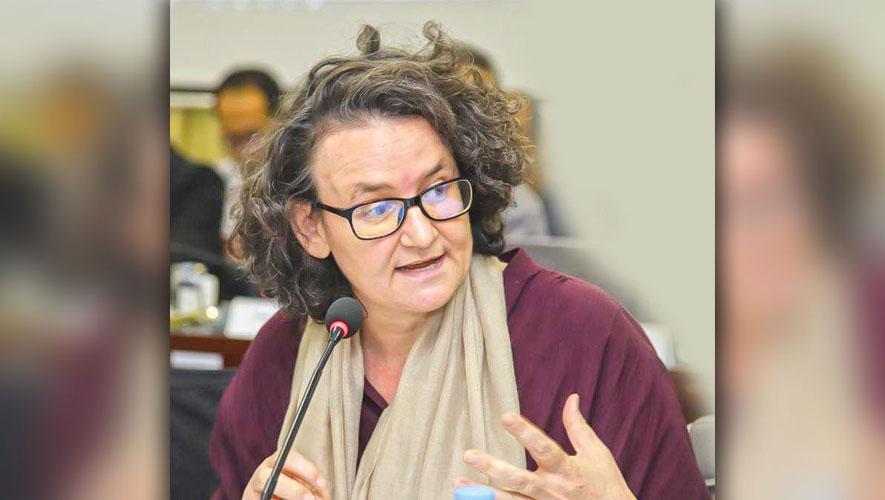With the rush towards so-called Industry 4.0 and the National Bank of Cambodia (NBC) casting a greater focus on the development of ecommerce and a digital economy, the Kingdom has seen a huge expansion of cashless payment services.
For the latest Cambodian Business news, visit Khmer Times Business
An analysis of the digital landscape conducted by We Are Social and Hootsuite found some 25.04 million mobile subscriptions and 8.1 million mobile social media users nationwide as of January 2019.
This development many believe will see the Kingdom strive to go cashless in the near-future.
However, with so many players all vying for such a small market, some critics are questioning the sustainability of the nascent financial technology (fintech) industry.

“I wouldn’t see it as a big issue, mainly because 60 percent of all payments are still done in cash,” says Matthew Tippetts, chief executive officer (CEO) and co-founder of Clik – a local digital payment service aggregator set to begin operations next year.
Tippetts will be the first to admit that these figures are widely only applicable to urban areas, but sees the growing faith in cashless payments as a promising indicator of the future.
“Effectively in urban areas, say on average, 30 percent of payments are digital, meaning card, mobile banking or app, but I think the vast majority is card. There are 16 payment service institutions, and I would say there must be at least 15 operational” says Tippetts.
Industry 4.0 is part of what is known as the fourth industrial revolution. It encompasses areas that are not normally classified as industry, such as smart cities.
In essence, industry 4.0 describes the trend towards automation and data exchange in manufacturing technologies and processes which include cyber-physical systems (CPS), the internet of things (IoT), industrial internet of things (IIOT), cloud computing, cognitive computing and artificial intelligence.
Clik has invested heavily into researching the market and the potential within it, finding that out of the 1,000+ people surveyed that 44 percent don’t currently use any form of in-store payment app, 30 percent use Pi Pay, 13 percent Wing and 2 percent use True Money.
Tippetts also explains that in 2017, Cambodia’s gross domestic product (GDP) was approximately $22 billion, there were close to 8.4 million smartphones, of which 1.5 million were used for e-payments and that the National Bank of Cambodia (NBC) estimated mobile e-payments to be worth $9.9 billion for the year. Tippetts hopes to see this grow in line with adoption and awareness of cashless alternatives.
Uniting a fragmented market
“So the issue is that even though apps are very widely accepted, the frequency of usage is incredibly low. People do not yet perceive that mobile payments provide enough value or are more convenient than cash or card,” notes Tippetts, but points out that this is a global problem.
“The reason we’re an aggregator is because there’s too much fragmentation – we provide a technological platform that enables merchants to better understand, better communicate and personalise their offers to their customers. We get the data from who these customers are by capturing the payments to provide value to the merchant,” Tippetts explains, stating that Clik is applying soon for its payment service provider licence from the NBC, and hoping to launch early next year.

CEO and Co-founder, Clik
For Tippetts, low frequency of digital wallet use stems from a lack of value to users and merchants. This, he believes, will come with further innovation – innovation he seeks to introduce to the Kingdom in the form of ultra-secure and convenient contactless mPOS (mobile Point of Sale) payment systems capable of replacing payment terminals; cash-back loyalty programs and customer data insights. All of this complying with the strictest data privacy laws and providing huge benefits to merchants and consumers. Clik is backed by global payment technology leaders OpenWay and MyPinPad, enabling them to be the first in South East Asia to launch this revolutionary mPOS and data intelligence technology.
This is precisely the sort of innovation that Tomas Pokorny, CEO of Pi Pay – a home-grown cashless payment service operating in Cambodia – hopes will drive further competition within the industry.
“There’s not enough innovation throughout – even from Pi Pay,” admits Pokorny, citing a nascent FinTech scene within the Kingdom and the subsequent limited resources to further develop products as the obstacle to this.
Financing innovation
“Cashless solutions have to make money, but essentially you’re trying to make it against the competition, to make it against the cash-based market. You’re battling a long-term versus short-term approach and you have to find the money to do it in Cambodia, which is a good investment market, but it’s not Silicon Valley,” argues Pokorny. “There’s not billions of dollars flowing in to create new solutions,” he adds.
While Tippetts welcomes more players in the cashless payment game – all the more for him to aggregate into Clik – Pokorny is also keen to see more competition, which he feels would drive more innovation within the industry.
“It’s actually a sad or funny or interesting thing – or all of that at the same time … when people, especially in young markets such as Cambodia, don’t want to talk about failures. They always have that mindset that they’re going to win, that they will be the one who makes it, but the unfortunate reality is that most companies of a young age – they don’t make it,” he muses.
He sees failure as an inevitability and while the industry may still be coming of age in Cambodia, he predicts that the growing number of services on the market now will shrink as the industry matures.
“I think that we are not far away from seeing market mergers and acquisitions, companies coming together because it happened in the telco industry where you have dominant Smart and Cellcard … followed by Seatel and Metphone. It consolidated itself, but it started with everybody getting a licence, because everybody wants a piece of piece of the pie and here we are.”
The threat, as Pokorny perceives it, lies not in the fear of too many players, but rather in too many failures – a risk that he believes could jeopardise the work of Pi Pay and others to create a sense of trust in cashless payments in a country that he argues has a legacy of cash-based transactions.
“It wouldn’t happen anywhere in the world, but here. You could actually walk to the car dealership and, I guarantee you, if you bring a bag of cash to buy a car, they will take it – there’s no limitations on that.”
He also disagrees with the overall prevalence of cashless payments, claiming that 40 percent of transactions sounds too high – given the scale of the market and the services available – and says he would expect to see anywhere between 20 and 30 percent of all transactions in Cambodia conducted through card or mobile payment service.
Fighting the legacy of cash
“So there’s a legacy of decades using cash and, with fintech, I think that people simply expect this to happen too fast. You will not be able to remove decades of legacy overnight, unless it comes back to legislation and regulators,” argues Pokorny. He notes that numerous people involved in Cambodia’s fintech scene have long been predicting the transition to a cashless society to be just around the corner, but he sees this as a much more long-term goal.
Regulation from the NBC has been unanimously praised by many fintech players, including Pokorny, who notes the difficulty in regulating evolving financial technologies.
“It’s so progressive, that sometimes even fintech has a tough time catching up – the NBC has quite ground-breaking ideas, but, with implementation, I think they will face same thing as fintech players – how do we convince the rest of the market to go cashless?” reflects the Pi Pay CEO.
Tippetts is perhaps more optimistic, claiming “Governments want to digitalise everything, because it’s the best way to fight against corruption, while enabling financial inclusion so that people can access financial services and making things seamless.”
“Wing looks at driving digitisation and cashless payments in the context of financial inclusion,” says Wing CEO, Manu Rajan. He notes that “If converting a financial transaction to a digital one helps bring an underprivileged and hence ‘unbanked’ Cambodian into the formal financial services sector and thereby provides them with access to products and services they otherwise would not have got access to, Wing would consider that digitisation has done what it is meant to be done.”
Expanding banking
Wing is one of the few cashless payment services that is ubiquitous across the Kingdom – particularly in rural areas, where the majority of the 78 percent of Cambodia’s unbanked reside. The World Bank reported that, in 2017, just 22 percent of Cambodians over the age of 15 had bank accounts.
“Wing believes Cambodia needs sustainable and transformative products and services from the fintech industry and not just discounts to drive trials from the already banked population,” says Rajan, who goes on to explain that the company did almost 100 million transactions in 2018 – carrying transaction volume worth 80 percent of the national GDP through some 1.6 million registered users.
This goes up to more than 5 million monthly users when counting the company’s agent banking customers.

The swelling enthusiasm for fintech in the Kingdom has attracted not just local entrepreneurs but it has the attention of international players. Just last month, Visa announced their security roadmap for Cambodia which, according to Shivakumar Sriraman – Visa’s chief risk officer for Southeast Asia – seeks to combat fraud and protect consumers making cashless payments.
“The market certainly isn’t saturated – even if there is a growing number of cashless payment systems in Cambodia, the ‘banked’ population is still quite low and less than 3 percent of all personal consumption expenditure is transacted digitally,” argues Sriraman, adding that Visa sees significant opportunity for growth in the Kingdom.
Dethroning physical money
“Although Cambodia is a relatively young market when it comes to electronic payments, we’ve seen very strong adoption with both merchants and consumers,” he says, citing the 2018 Visa Consumer Payment Attitudes Study that found around a third of Cambodians expect digital payments will grow in popularity because of their convenience and security compared with cash, especially since the development of blockchain technology and the fact that notes get worn out.
The study also highlighted that 54 percent of Cambodians believe the economy can go fully cashless within the next seven years and that a third of Cambodians also showed interest in making payments by scanning a QR code. This, Sriraman says, is a technology Visa launched in Cambodia late last year, in partnership with banks.
He explains QR payments are now accepted at more than 2,000 outlets – more than three times as many outlets as when the technology was launched.
Continued economic growth within the Kingdom offers plentiful opportunities for fintech.
The NBC’s forward-thinking approach to digital solutions to money-laundering, fraud and corruption have only spurred growth in the industry, but how the industry will transform as it matures will determine winners and losers in the race to dethrone cash as king, money as monarchy, pennies as potentates.




